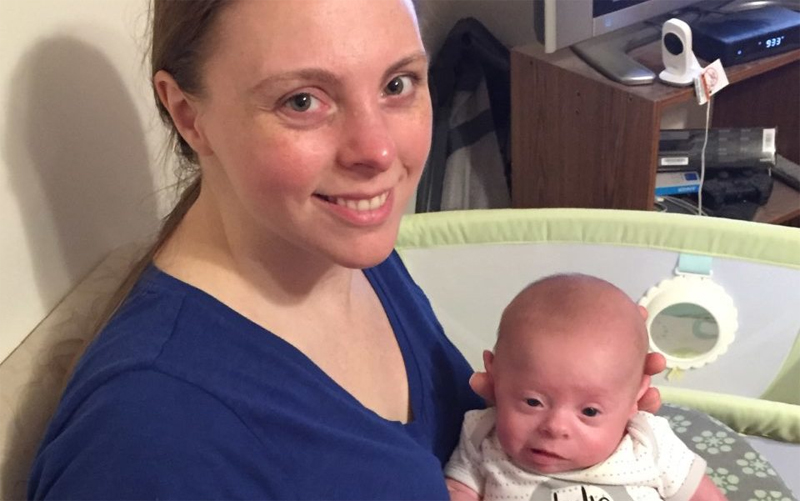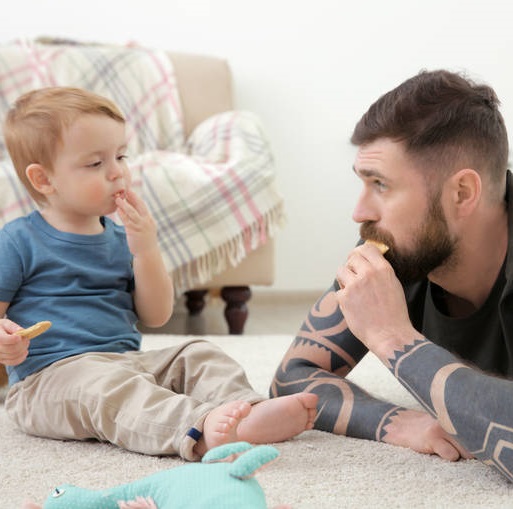At the Ready for an At-Risk Birth

October 12, 2020
Suzanne Hahl, age 40, sat down to relax in her Middletown, New Jersey, home after celebrating her son’s first birthday when she started to feel a little odd.
At 33 weeks pregnant with her second son, Suzanne planned to check in to the hospital the following day. Her current pregnancy was complicated by vasa previa, a rare condition that occurs in one in every 2,500 deliveries. This condition causes the umbilical vessels to run through the fetal membranes before they attach to the placenta, putting both the mom and baby at risk of bleeding.
Despite the seriousness of the condition, her doctor had a plan. The baby would be given steroids to spur lung development, and Suzanne would be monitored until as late as 36 weeks. At that point, she would have a C-section—unless an emergency required her to deliver sooner.
When Suzanne’s water broke shortly after the birthday party, she knew that was happening.
A True Emergency
Suzanne was rushed to Riverview Medical Center by ambulance—alone because of COVID-19 restrictions. There, her obstetrician, Eugene Kaskiw, M.D., was on call, along with anesthesiologist Paul Ritchie, M.D., and neonatologist Ann Ross, M.D. Riverview has a hospitalist program that keeps these board-certified specialists in-house at all times, which isn’t commonly found across the country. The fact that all of them were at the ready was crucial to Suzanne’s survival and that of her unborn baby.
As soon as Suzanne arrived, the team sprang into action. Dr. Kaskiw passed Dr. Ritchie in the hallway and briefed him on the case. “Normally, we have time to administer spinal anesthetic,” which doesn’t require intubation and allows the mother to be awake for the birth, Dr. Ritchie says. “But this was one of those true emergencies. So I started preparing for emergency general anesthetic.”
As Suzanne was wheeled to surgery, one of the nurses used her hand to push back the umbilical cord that had prolapsed, or fallen out. Suzanne’s IV and breathing tube were inserted, Dr. Kaskiw made the incision for the C-section, and the baby was born within 10 minutes of Suzanne’s arrival to the hospital.
Initially, the baby was not moving and was immediately taken out of the operating room to be cared for by Dr. Ross. “Vasa previa and cord prolapse may compromise the baby’s oxygenation before birth. A decrease in blood flow secondary to bleeding and cord compression is a medical emergency,” Dr. Ross says. “Baby Hahl was born with a low heart rate and poor respiratory effort, requiring immediate resuscitation that was started right after birth. After a few minutes, his heart rate improved and he began breathing on his own. The baby was then taken to the Special Care Nursery.”
As Dr. Kaskiw and fellow obstetrician Mary Witkowski, M.D., were closing Suzanne’s incision, a nurse returned to the operating room to deliver the good news that the baby was stable and healthy. “Everyone yelled, ‘What?!’ Nobody could believe it,” recalls Dr. Ritchie.
“It was a remarkable feat due to amazing teamwork,” says Dr. Kaskiw. “This was a well-orchestrated effort. Everyone knew exactly what they had to do. Without having all the physicians in-house, we certainly couldn’t have delivered the baby as rapidly as we did, and the likelihood of survival would have been lower.”
When Suzanne awoke, she learned that her son needed to be transferred to K. Hovnanian Children’s Hospital at Jersey Shore University Medical Center. She asked to see him first and was able to visit him in his incubator. “I put my finger in, and he grabbed my hand,” she recalls. Suzanne went home four days later, but because he was premature, her son would spend a month at the Children’s Hospital.
What’s in a Name?
As they anticipated the birth of their second son, Suzanne and her husband, Richard, had been deciding between the names of William and Logan. After the whirlwind Suzanne went through, they decided she would get the final pick and settled on William. For a middle name, they chose Eugene, after Dr. Kaskiw.
“We named William after one of the doctors who saved my baby’s life and my life,” Suzanne says.
In a heart-warming coincidence, not only do Suzanne’s two sons share the same birthday, but Dr. Kaskiw shares the date with them as well—and he delivered her first son, Henry, too.
“It was extremely touching that she gave the baby my name as his middle name,” Dr. Kaskiw says. “The fact that you touch two people—the baby and the mom—as an obstetrician, the level of responsibility and the level of satisfaction is extremely high. It’s why we’re all in this field.”
Now home as a family, the Hahls are adapting to life with two boys under age 2. They’re grateful for the help they get from family and the exceptional care that Suzanne and William received at Riverview and the Children’s Hospital.
“I’m grateful for everything the whole team of doctors did,” Suzanne says. “When I was in the hospital by myself and recovering, all the nurses, doctors, anesthesiologist and even people in the ambulance spent time with me and talked with me because they knew I was by myself. I really appreciated that.”

Next Steps & Resources:
- Meet our sources: Eugene Kaskiw, M.D., Paul Ritchie, M.D., and Ann Ross, M.D.
- To make an appointment with Eugene Kaskiw, M.D., Paul Ritchie, M.D., Ann Ross, M.D. , or another provider, call 800-822-8905 or visit our website
The material provided through HealthU is intended to be used as general information only and should not replace the advice of your physician. Always consult your physician for individual care.
Find a doctor near me
COVID-19: Tips for Expectant Parents

COVID-19: Pregnancy Tips from Dr. Schultz & Dr. Mabanta. Learn expert advice for expecting parents. Prepare for a safer pregnancy and delivery. Call 800-822-8905.
What to Expect from an MFM Specialist

A doctor or midwife may make referrals to a maternal fetal medicine specialist for care.
Find a doctor near me

Change of Birth Plans
Unexpected birth plan changes? Ocean Medical Center's skilled team provides exceptional care. Learn Dena's story and find support.
Sperm Retrieval and IVF Help Couple Realize Dream of Conceiving A Biological Child
IVF & Sperm Retrieval Success Story. Learn how one couple overcame infertility challenges and welcomed a baby. Schedule your consultation today.

Tiny Fighter
Addie's cancer journey: Learn how Dr. Hanson's innovative treatment helped her. Find pediatric oncologists & resources. Call 800-822-8905.

A Head Start at Breastfeeding
Get a head start on breastfeeding. Riverview Medical Center offers expert lactation consultant support to help you and your baby. Call 800-822-8905.
